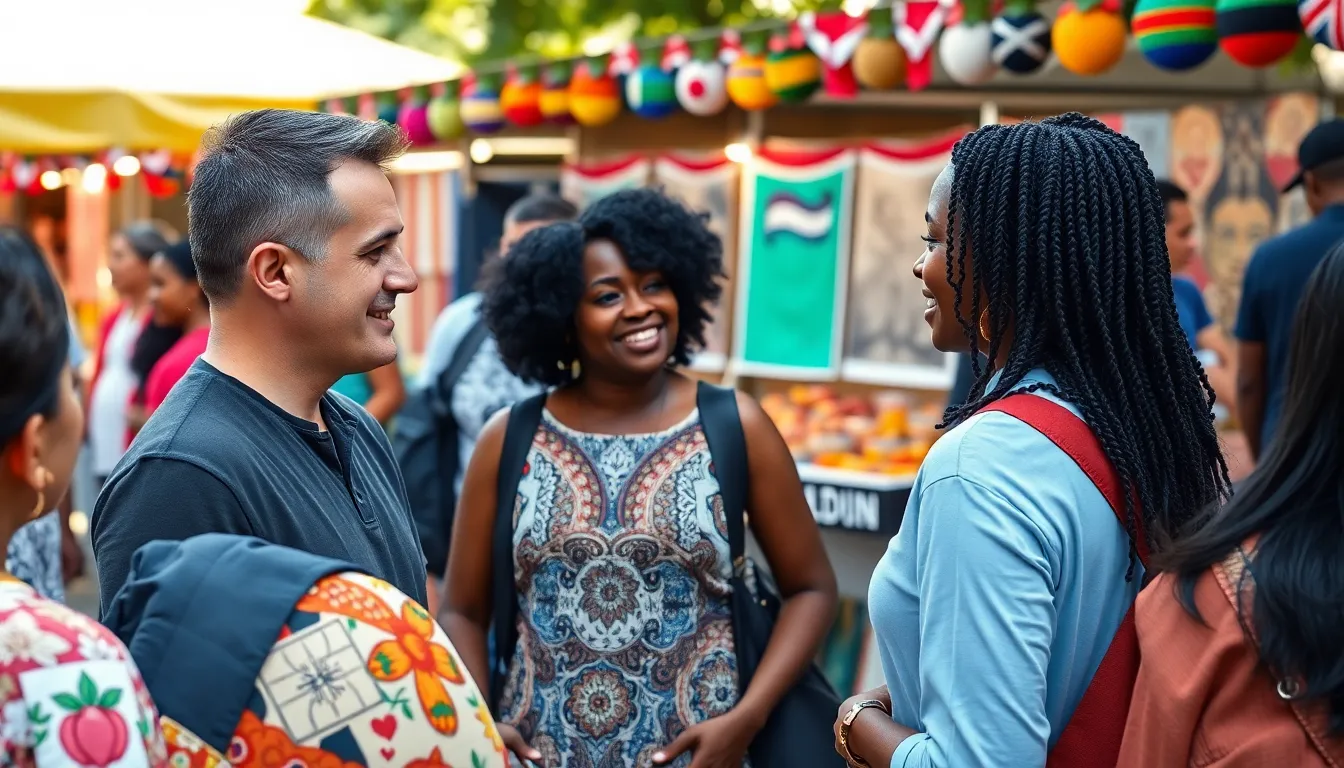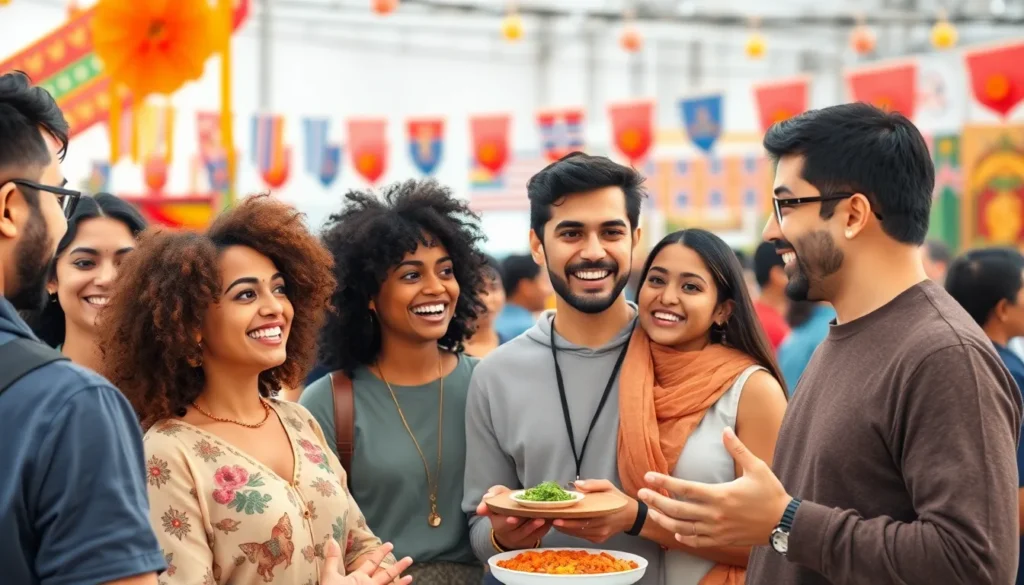In a world that’s more connected than ever, cultural understanding isn’t just a nice-to-have; it’s a must-have. Imagine navigating a global buffet where every dish has a story, and missing out on the flavors could lead to some awkward dinner conversations. With a sprinkle of humor and a dash of curiosity, embracing diverse cultures can turn the mundane into the extraordinary.
Cultural understanding opens doors to richer experiences and deeper connections. It’s like finding the secret sauce that makes every interaction a little more flavorful. Whether it’s sharing a laugh over a cultural faux pas or discovering the beauty in differences, the journey is as rewarding as the destination. Dive in and see how understanding different cultures can transform perspectives, foster empathy, and create a world that’s not just livable but downright delightful.
Table of Contents
ToggleWhat Is Cultural Understanding?
Cultural understanding encompasses recognizing and appreciating the values, beliefs, customs, and traditions that shape different societies. It involves actively engaging with others to learn about their backgrounds, which fosters empathy and respect. Through understanding various cultural perspectives, individuals can navigate diverse environments more effectively.
Different cultures manifest unique expressions in art, communication styles, and social norms. People who appreciate these differences enhance their ability to connect with others, leading to enriched personal and professional relationships. Noticing distinctions in cultural practices can significantly impact international business interactions, making stockholders and employees feel valued.
The concept also includes recognizing biases that often cloud judgment. Identifying one’s assumptions promotes a more open-minded approach to different cultures. Engaging in conversations about cultural disparities encourages dialogue and deepens relationships within communities.
Experiencing cultural understanding can lead to transformative personal growth. Immersing oneself in unfamiliar cultures often unveils new perspectives and enriches one’s worldview. For example, traveling to different countries exposes individuals to varied culinary practices, festivals, and customs that might differ significantly from their own.
Establishing cultural understanding transforms mundane interactions into meaningful exchanges. It facilitates a global mindset that appreciates diversity as a strength. Practicing this awareness creates an environment where individuals feel more at ease expressing themselves, ultimately leading to a more harmonious and inclusive society.
Importance Of Cultural Understanding

Cultural understanding plays a vital role in today’s interconnected world. It enhances interactions and experiences through recognition and appreciation of diversity.
Enhancing Communication
Effective communication thrives on cultural understanding. Individuals who appreciate different cultures often convey messages with greater clarity. Understanding nuances in language and non-verbal cues minimizes misunderstandings. This awareness fosters meaningful conversations and connections. Real-world examples show successful businesses benefiting from culturally aware teams. Employees equipped with cultural skills excel in negotiations and collaboration. Thus, enhancing communication leads to stronger relationships across borders.
Fostering Respect And Tolerance
Respect and tolerance stem from cultural understanding. By recognizing different values and beliefs, individuals develop a sense of empathy. Engaging with diverse communities cultivates open-mindedness. Awareness of biases helps challenge preconceived notions that isolate individuals. Events promoting cultural exchange demonstrate the power of understanding. These encounters foster harmonious coexistence and uplift communities. Ultimately, fostering respect and tolerance nourishes an inclusive society that celebrates differences.
Barriers To Cultural Understanding
Barriers to cultural understanding hinder the appreciation of diverse societies. These obstacles, such as stereotypes and language differences, limit meaningful interactions.
Stereotypes And Prejudices
Stereotypes reduce individuals to generalized traits, often neglecting the unique aspects of their cultures. Prejudices arise from these stereotypes, fostering negative attitudes toward particular groups. These preconceived notions can create significant barriers to communication, as they lead to misinterpretations of behaviors and intentions. Challenging stereotypes through education enables individuals to approach others with an open mind. Engaging with diverse perspectives allows for a deeper connection and understanding. Certain stereotypes may perpetuate divisive views, ultimately impacting relationships adversely. It’s crucial to promote awareness and dialogue to dispel these harmful beliefs.
Language Differences
Language differences often present challenges in cross-cultural communication. Variations in vocabulary, idioms, and dialects can lead to misunderstandings. Misinterpretation of messages may occur when individuals are unfamiliar with linguistic nuances. Non-verbal communication, such as body language and gestures, also varies across cultures, potentially causing confusion. Learning about these differences enhances interactions and builds rapport. Individuals can cultivate effective communication skills by focusing on active listening. Understanding the importance of clarity and context in language use fosters respect and minimizes potential conflicts. Addressing language barriers promotes inclusivity and strengthens relationships among diverse groups.
Strategies For Improving Cultural Understanding
Cultural understanding can enhance relationships and promote mutual respect. Implementing effective strategies fosters connection among diverse groups.
Active Listening
Active listening enhances communication and builds trust across cultures. Individuals practicing active listening focus on the speaker, acknowledging their words and emotions. They also ask clarifying questions to ensure clarity, demonstrating genuine interest. Observing non-verbal cues like tone and body language can provide context and further understanding. Responding thoughtfully to what others express fosters deeper connections, creating an environment of openness. By fully engaging in conversations, individuals strengthen their relationships and make all participants feel heard.
Engaging In Cultural Exchange
Engaging in cultural exchange presents opportunities to broaden perspectives. Taking part in community events, workshops, and cultural festivals allows individuals to experience diverse traditions and customs. Attending cooking classes, art exhibits, and music performances introduces new ways of thinking and enhances appreciation for different cultures. Participating in dialogue groups promotes understanding through shared experiences and stories. These interactions encourage respect and empathy, breaking down barriers and dispelling stereotypes. When individuals immerse themselves in other cultures, they cultivate a sense of community and global belonging.
Cultural understanding is essential in today’s interconnected world. It fosters empathy and respect while enriching personal and professional relationships. By embracing diverse cultures with curiosity, individuals can transform everyday interactions into meaningful exchanges.
Overcoming barriers like stereotypes and language differences is crucial for deeper connections. Active listening and engaging in cultural exchanges are effective strategies that promote inclusivity and strengthen bonds among diverse groups.
Ultimately, cultivating cultural awareness leads to a more inclusive society. It allows individuals to celebrate diversity as a strength and encourages harmonious coexistence. The journey towards cultural understanding not only enhances communication but also uplifts communities, creating a global mindset that benefits everyone.




